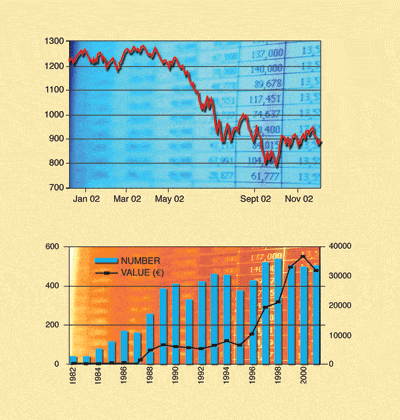This market is on the rise as private equity players scour the Continent for bargains.
Driving that surge is a complex web of economic and financial stresses: Companies are seeking to divest underperforming units or operations that expose them to regulatory risk theyre no longer happy to take. Anemic stock marketsby mid-December the Eurotop 300 was down 26% on the yearhave effectively closed the public route. Trade buyers, often bowed down by debt and in need of consolidation, are unable to compete. For private equity players the result is a buyers market.
There is much more pressure to focus, as with the restructuring of PLCs, says Marc Pacitti, private equity partner at advisers Deloitte & Touche in London. This pressure is threefold: pressure from shareholders, pressure from management and pressure from banks, he adds, noting that they are really forced sellers, which means for private equity that this is a great time.
Weve been here before, of course. In the late 1990s private equity houses rushed to set up shop in London, Paris and Munich to take advantage of a much-trumpeted wave of corporate restructuring set to unroll across the Continent.
That happenedsort of. But most of the real action was at the top end of the market, with European titans shuffling assets between themselves. Far fewer small businessmen from Germanys Mittelstand sold up as they retired than had been expected, instead finding a way to muddle through. Hungry US buyers such as Kohlberg Kravis Roberts and Texas Pacific found themselves twiddling their thumbs.
Now, though, there are signs that things are changing. Take France Tlcom. Loaded with $70 billion of debt, the state-owned company is selling off assets to regain stability and meet interest payments falling due this year and beyond. It agreed last month to sell Casema, its Dutch cable company, to two American private equity firms, Providence Equity Partners and the Carlyle Group, for $700 million.
Scandal-hit French media conglomerate Vivendi Universal sold its Houghton Mifflin American publishing interests last year to an amalgam of private equity firms for $1.7 billion. The company has also announced that it is looking to get rid of its US entertainment assets this year.
Those deals are pumping up volumes. A December 2002 KPMG report showed that while global M&A; activity has fallen for five consecutive half-yearly periods, it was the private equity share that was most resilient. At the 2000 peak of the M&A; boom, private equity backed just 2% of total volume; by 2002 that share had climbed to 6%.
Overall buyout volume will likely be marginally up in 2002. The European Venture Capital Association says there were $29.3 billion of deals completed by the start of December, compared with $31.6 billion for the whole of 2001.
Weve actually revised down further our outlook for the last quarter of 2002, says Andrew Burrows, director of Nottingham Universitys Centre for Management Buyout Research, which tracks deals in association with the EVCA. The whole M&A; scene is very quiet at the moment, but bearing that in mind, buyouts are holding up reasonably well.
Large deals such as Madison Dearborn Partners E3.7 billion purchase of Irish paper and packaging company Jefferson Smurfit have snagged headlines, but in reality most funds are sitting on undeployed cash. Others have returned money to their partners. Its part of the cycle really, says Burrows. A lot of that money was raised on the back of what was a booming sector. There will be pressure to invest, but if, say, a fund works on a 10-year cycle, then they may have three or four years to invest. And investors are still funneling money into European private equity funds, if on a more selective basis than hitherto. CVC Capital Partners raised $4.65 billion during the year. Ex-Nomura banker Guy Hands recently closed his first Terra Firma fund with over $1 billion.

|
|
|
Rates of return may be down: Private equity has historical return rates of around 30%, while a survey by private equity information provider AltAssets shows that its users expect annual returns from buyouts to be around 17% over the next five years. Still, set against swooning public stock markets, thats juicy. People are finding the returns on buyouts relatively quite attractive, says Tony Boyle, head of private equity-Europe at Henderson Global Investment, particularly with prices falling over the second half of 2002.
In December UK drinks giant Diageo sold Burger King to a consortium headed by Texas Pacific Group. The private equity group paid $1.5 billion, around a third less than when a price was first hammered out in July. With prices falling, some potential buyers are sitting on the sidelines. Weve seen a number of deals of late but just decided to wait, says Graeme White, managing director of Barclays Private Equity. The pipeline of investments for next year will be stronger for industry as a whole, and we believe opportunities will open up.
White says market volatility makes it harder to gauge true value. Niche firms such as Terra Firma are concentrating on buying up pieces of the Continent that are less susceptible to the vagaries of the economic cycle. In December, for example, Terra Firma bought 42,000 apartments in Cologne, Germany, from the Rhineland citys government and a savings bank for $1.9 billion.
Theres little doubt that even in a reviving market the gung-ho attitude of earlier days is no longer appropriate. Some firms are nursing wounds from earlier investments that went sour. CVC Capital Partners and Citicorp Venture Capital took UK soda ash maker Brunner Mond private in September 1998, but the company struggled under a debt burden of 15 billion a year. Bondholders were handed the companys keys in December 2001 in one of the first high-yield bond restructurings in Europe.
In the face of closed new-issue markets, economic uncertainty and the paralysis of trade buyers, private equity players have struggled to cash out of even well-performing investments.
Now is not an easy time to exit, says Deloitte & Touches Pacitti. But there is pressure to do so and to demonstrate value. Whereas people used to do the deal and only a couple of years later think about exit strategy, now its key to look ahead.
Hendersons Boyle adds: Deals are taking much longer to complete, and people are taking longer to see whats happening. In the old days you might just buy a business, wait for the market to get better and then sell it for more. Now theres a lot more to it than that.
Little surprise, then, that the secondary buyout market (private equity outfits selling to each other) has proven a viable means of escape for many. High-profile deals last year included the September sale of Invicta Leisure of the United Kingdom by Electra Partners Europe to Duke Street Capital for 100 million. In Europe BC Partners sold textile cleaners Elis to BNP Paribas for more than E1 billion.
To some critics thats little more than a game of corporate pass-the-parcel, but private equity players are not about to snub any potential source of liquidity. As in any business, private equity is market driven, says Richard Green, managing director of private equity firm Kleinwort Benson in London. Our investors like to see cash back.
With some pretty large bets being laid in Europe, those investors will be hoping for a big payout.
An Open-and-Shut Case
Always a contentious issue in the world of private equity, the question of transparency was forced to the fore in October when Texas Universitys investment company was forced by a US newspaper under the Freedom of Information Act to release details of its private equity partnerships. The litigation bug is catching: California public pension company CalPERS and Yale University are among the institutions now being pursued for information through the courts.
The posting of private equity fund data on Texas Universitys Web site caused an uproar, with some insiders suggesting that the university would not be able to easily place money with funds in the future.
Clearly, some of the sensitivity comes from funds reluctance to be compared to their peers. But misinterpretation of data also concerns private equity firms. One of the funds on the [Texas University] Web site was posted as having a 6% return on equity and was therefore viewed by people as underperforming, says Richard Green of Kleinwort Capital. But given that this was a year-2000 fund, the result was actually very good. One typically expects negative returns in the first three years of a fund. This is the danger when people dont understand.
Transparency itself is a very good thing, continues Green, but provided information is provided like-for-like and within a framework that people understand.
That debate has already moved across the Atlantic. In a gesture toward greater and homogenous disclosure, the British Venture Capital Association has drawn up draft guidelines on reporting standards, which it encourages its members to meet. The organizations Europe-wide counterpart, EVCA, is also pushing for more-uniform reporting.
Some argue that disclosure should simply be between limited and general partners, not least because institutional investors would not want their own performance figures aired. But communication between private equity groups can be poor once funds are committed. One specialist argues that when private equity firms seek to raise funds, they are open with their figures, but adds that apart from that, theres hardly any disclosure. They all say that theyre upper-quartile. So where are the other quartiles?
|
Here are some of the deals that are waking up Europes buyout market |
|
Legrand A consortium led by Frances Wendel Investissement and KKR of the United States bought the 98% stake that French electrical group Schneider Electric had in their compatriot rivals. The group paid E3.63 billion but demonstrated caution in this secondary market deal, which came in at a cash-to-debt gearing ratio of around 1:2. Jefferson Smurfit American firm Madison Dearborn paid E3.7 billion for the Irish paper and packaging company in Europes largest deal in 2002. This deal was one of several that put Ireland at the fore of public-to-private activity. Tldiffusion de France Debt-laden France Tlcom sold TDF, a French broadcasting unit, to a consortium of equity firms for E1.6 billion in a rare buyout from the tech sector. Source: Global Finance |
Benjamin Beasley-Murray



